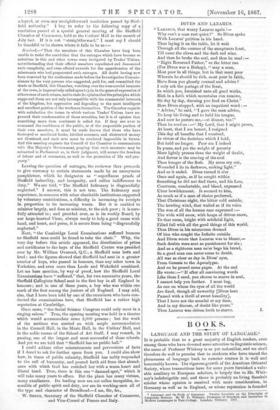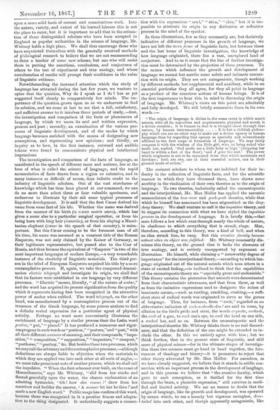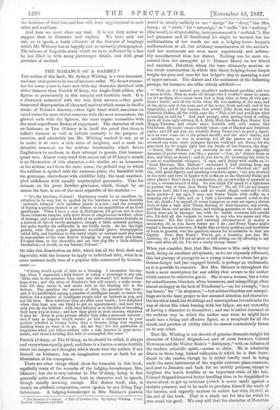BOOKS.
LANGUAGE AND THE STUDY OF LANGUAGE.*-
IT is probable that to a great majority of English readers, even among those who have devoted some attention to linguistic science, the name of Professor Whitney is as yet unfamiliar, and we shall therefore do well to premise that to students who have traced the phenomena of language back to remoter sources it is well and honourably known. The vigorous growth of the American Oriental Society, whose transactions have for some years furnished a valu- able auxiliary to European scholars, is largely due to Mr. Whit- ney's indefatigable zeal, and there is probably no living Sanskrit scholar whose opinion is received with more consideration, in Germany as well as in England, or whose reputation is founded * Language and the Study of Language. Twelve Lectures on the Principles of Linguistic Science. By W. D. Whitney, Professor of Sanskrit, and Instructor in Modern Languages in Yale College. London: Trlibner. 1567.
upon a more solid basis of earnest and conscientious work. Into ' the nature, variety, and extent of his learned labours this is not the place to enter, but it is important to add that in the estima- tion of those distinguished scholars who have been accepted in England as popular authorities in the science of language, Mr. Whitney holds a high place. We shall thus encourage those who have acquainted themselves with the generally received methods of Oilo'ogical research to believe that we are not recommending to them a teacher of some new scheme, but one who will assist them in putting the assertions, conclusions, and conjectures of others to the test of experiment and true analogy, and whose corroboration of results will prompt fresh confidence in the value of linguistic evidence.
Notwithstanding the increased attention which the study of language has attracted daring the last few years, we venture to opine that the question, Why do I speak as I do ? has as yet suggested itself clearly to comparatively few minds. The im- portance of the question grows upon us as we endeavour to find its solution, and we come at last to see that a full, satisfactory, and sufficient answer to it involves three periods of study, —first, the investigation and comparison of the facts or phenomena of language, by which we mean its oral and written expression, present and past ; secondly, an examination of the various pro- cesses of linguistic development, and of the modes by which language becomes enriched with the means of designating new conceptions, and representing new opinions; and thirdly, an inquiry as to how, in the first instance, outward and audible tokens were found to communicate physical and intellectual impressions.
The investigation and comparison of the facts of language, as manifested in the speech of different races and nations, lies at the base of what is called the science of language, and the rapid accumulation of facts drawn from a region so extensive, and in many instances so difficult of access, does infinite credit to the industry of linguistic scholars. Out of the vast storehouse of knowledge which has thus been placed at our command, we can do no more than select three or four valuable specimens, and endeavour to illustrate by their aid some typical processes of linguistic development. It is said that the first Ctesar derived his name from some fact of his life. Whether the name was derived from the manner of his birth (a c.Eso matris utero), which has given a name also to a particular surgical operation, or from his being born with long hair (cwsaries), or from his slaying a Mauri- tanian elephant (cwsar in the speech of that country), is unim- portant. But this Czesar coming to be the foremost man of all his time, his name was assumed as a constant title of the Roman Emperors, was not only claimed by the Kaiser of Germany, as their legitimate representative, but passed also to the Czar of Russia, and thus became the equivalent of "Emperor" in two of the most important languages of modern Europe,—a very remarkable instance of the elasticity of linguistic materials. The third per- son in the triad of European Emperors acquired his title by a more contemplative process. If, again, we take the compound denomi- nation electric telegraph and investigate its origin, we shall find that its factors were established in our language by very different processes. "Electric "means, literally, "of the nature of amber," and the word has acquired its present signification from the quality which it represents having first been recognized in the attractive power of amber when rubbed. The word telegraph, on the other hand, was manufactured by a contemplative process out of the treasures of the Greek language, by some person anxious to find a definite verbal expression for a particular agent of physical activity. Perhaps no word more conveniently illustrates the enrichment of language by a similar process than the Latin word positus," put," " placed." It has produced a numerous and vigor- ens progeny in such words as" position," "posture," and "post," with all their different nuances of meaning, and their compounds, "impo- sition," " composition," "supposition," "imposture,"." compost," " posthorse," " postboy," &c. But besides these two processes, which we maycall the arbitrary andthecontemplative processes,—although definitions are always liable to objection when the materials to which they are applied run into each other at all aorta of angles,— we must take prominent note of another process, which we shall call the impulsive. "When the first schooner ever built, on the coast of Massachusetts," says Mr. Whitney, "slid from her stocks and floated gracefully upon the water, the chance exclamation of an admiring bystander, 'Oh ! how she scoons 1' drew from her contriver and builder the answer, 'A scooner let her be then !' and made a new English word." Public usage has confirmed this word, because there was recognized in it a peculiar fitness and adapta- tion to the thing designated. It undoubtedly suggests a connec-
tion with the expressions "scud," "skim," "akin," but it is im- possible to attribute its origin to any derivative or reflective process in the mind of the speaker.
In these illustrations, few as they necessarily are, but decisively indicative of different processes in the growth of language, we have not left the terra firma of linguistic facts, but between these and the last home of linguistic investigation, the knowledge of how language originated, there lies a vast, unexplored land of conjecture. And to us it seems that the line of further investiga- tion must be determined by the projection of these processes. To the causes which influence the growth and development of language we cannot but ascribe some subtle and intimate connec- tion with its origin. They are not antagonistic, though working by different methods, but supplemental and auxiliary, while in an essential particular they all agree, for they all point to language as a product of the conscious actions of human beings. It is of the first importance to bear this in mind in discussing the origin of language. Mr. Whitney's views on this point are admirably and fully developed. We will briefly summarize them in his own words :—
"The origin of language is divine in the same sense in which man's nature, with all its capacities and acquirements, physical and moral, is a divine creation ; it is human in that it is brought about through that nature, by human instrumentality It is but a childish philoso- phy which can see no other way to make out a divine agency in human language than by regarding that agency as specially and miraculously efficient in the first stage of formation of language. We may fairly compare it with the wisdom of the little girl, who, on being asked who mado her, replied. 'God made me a little baby so high ' (dropping her hand to within a foot of the floor), 'and r grew the rest.' The power which originates is not to be separated from that which maintains and develops ; both are one, one in their essential nature, one in their general mode of action."
The eminent scholars to whom we are indebted for their in- dustry in the collection of linguistic facts, and for the scientific manner in which they have discussed them, have shown some acerbity in the vindication of their own theories as to the origin of language. - To two theories, technically called the onomatopoetic and the interjectional, Mr. Max Muller has applied the sarcastic
nomenclature of the bow-wow and pooh-pooh theories, while that which he himself has announced has been stigmatized as the ding- dont.' theory. We shall venture to call it the impulsive theory, and to suggest its connection with what we have styled the impulsive. process in the development of language. It is briefly this,—that man follows a law which runs through nearly the whole of nature, in obedience to which everything that is struck, rings. Kan, therefore, according to this theory, was a kind of bell, and when an idea struck him, he rang. But this creative faculty became extinct when its object was fulfilled.- Mr. Whitney summarily dis- misses this theory, on the ground that it lacks the elements of
true analogy, and is entirely unsupported by argument or illustration. He himself, while claiming a "noteworthy degree of importance" for the interjectional theory,—according to which lan- guage originated oat of the natural sounds which man utters in a state of excited feeling,—is inclined to think that the capabilities of the onomatopoetic theory are "especially great and undeniable." This theory sustains the pretension that animals were denominated from their characteristic utterances, and that from these, as well as from the imitative expressions used to designate the noises of inanimate nature,—such as rustling, crackling, crashing,—a suffi- cient store of radical words was originated to serve as the germs of language. Thus, for instance, from "cock," regarded as an abbreviative imitation of cock-a-doodle-doo ! are said to come, by allusion to the bird's pride and strut, the words coquette, cockade, the cock of a gun, to cock one's eye, to cock the head on one side, a cocked hat, and so on. Between the onomatopoetic and the interjectional theories Mr. Whitney thinks there is no real discord- ance, and that the definition of the one might be extended to in- clude the other. ' In this we entirely agree with him ; but we think further, that in the present state of linguistic, and still more of physical science—for in the ultimate stages of investiga- tion these two sciences must go hand in hand together, the fore- runners of theology and history—it is premature to reject that other theory advocated by Mr. Max Miller. For ourselves, as we have already suggested, we believe that it stands in subtle con- nection with-an important process in the development of langtiage, and in this process we believe that "the creative faculty, which gave to each conception, as it thrilled for the first time through the brain, a phonetic expression," still survives in modi- fied and limited activity. We see no reason to doubt that the
origin of language, like its growth and development, was operated by causes which, to use a homely but vigorous metaphor, dove- tailed into each other, and though apparently antagonistic, like
the doctrines of fixed fate and free will, were supplemental to each other and auxiliary. -
And here we must close our task. It is our duty rather to suggest than to illustrate and explain. We have only cat out, so to speak, a hasty silhouette of the features of language which Mr. Whitney has so happily and so correctly photographed. The scheme of linguistic study which we have indicated by a line he has filled in with many picturesque details, and with great precision of method.




































 Previous page
Previous page